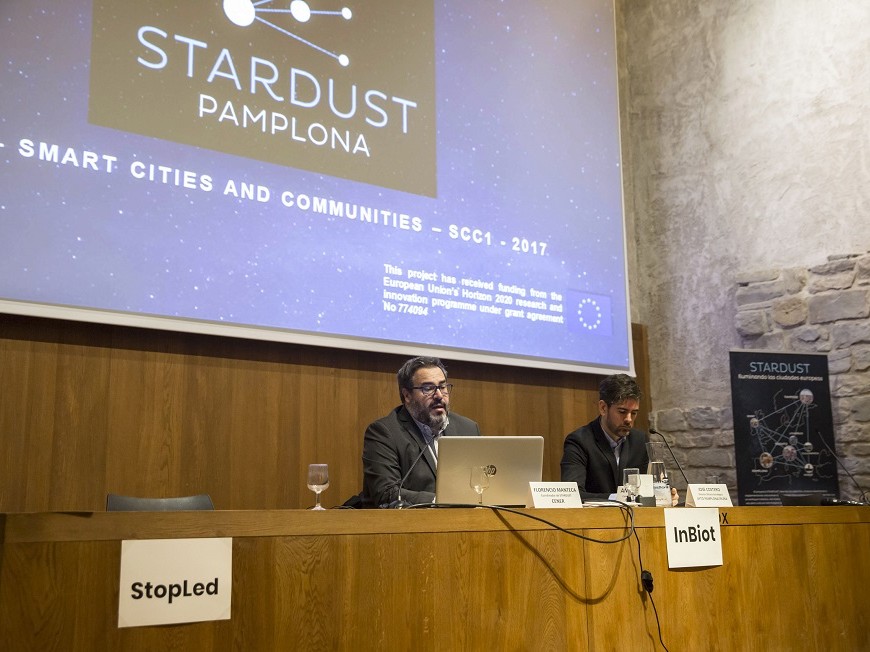Pamplona unveils new results from its smart city programme
On the 21st of January 2020, the Pamplona City Council, partner of the EU-funded project STARDUST, organised the workshop "Smart cities and Living Labs: New opportunities for entrepreneurs, startups and businesses". The event gathered approximately 70 participants from public authorities and the business and research & education sectors. The workshop is part of the activities that the STARDUST Lighthouse cities of Pamplona, Tampere (Finland) and Trento (Italy) are implementing in the framework of the Smart Cities Innovation Ecosystems. The event was opened by the Councillor for Strategic Government, Commerce and Turisme, Mrs Ana Elizalde, who highlighted the role of local authorities in boosting local innovation and entrepreneurship. The first session of the event was dedicated to a presentation of the STARDUST project by its coordinator Mr Florencio Manteca (CENER). Mr Manteca described the framework in which the different local activities are being implemented. This was followed by the main session of the event, dedicated to Living Labs (open innovation and user centred experiences, where users are involved from the very beginning of the innovation process to the validation of its outcomes in real life) and the Entrepreneurial Discovery Process (EDP). Jose Costero (Pamplona City Council) presented related concepts and their practical implementation in Pamplona under the Smart Iruña Lab programme. The Smart Iruña Lab programme was launched in 2018 to test a first set of five projects under real conditions throughout 2019. Representatives from these projects presented their results during the workshop. The entrepreneurs participating in the first edition of the Smart Iruña Lab rated it very positively (8.3 out of 10), in particular the training and business advice received, as well as the accessibility and support to run the pilot tests in a real environment. Costero then closed the session with the announcement of the second edition of the programme. The call should be opened towards mid February 2020. The five projects involved in the first edition of the Smart Iruña Lab were STOPLED, uRAD, AGROPESTALERT, Smart AQUA and INBIOT. STOPLED is a project on road safety, focusing on LED bands placed on sidewalks and exits of public or private parkings to warn pedestrians of the imminent opening or closing of the doors at the arrival of vehicles. They can also be installed on pedestrian walkways with or without traffic lights to reinforce road safety. uRAD addresses sustainable mobility, with radar sensors monitoring the traffic of all types of vehicles and people moving through a particular space. The collected data, including real-time information, can be used to improve urban mobility. AGROPESTALERT develops intelligent traps to detect pests affecting crops from their biometric character. Smart AQUA offers smart irrigation by calibrating soil type and crop and by using an algorithm to irrigate when necessary and based on the needed amount. This may increase saving by 50%. INBIOT monitors indoor air quality and improves it through specific sensors, algorithms, and a real-time access platform based on its database. The second session of the workshop included presentations by Paula Noya (ADItech) on the Technological capabilities of the Navarre Innovation System (SINAI) and its alignment with the needs of a Smart City; María Sanz de Galdeano (CEIN), focusing on CEIN activities such as training, support to the creation of new enterprises and their cooperation with the University and the City Council; and Miguel Garcia (Zabala Innovation Consulting) on New opportunities for digital entrepreneurship in Europe, who presented financial opportunities for startups under the Blockchers, NGI Explorers and NGI Dapsi H2020 projects. See the full version of the news here: https://stardustproject.eu/news/pamplona-unveils-new-results-from-its-smart-city-programme/



